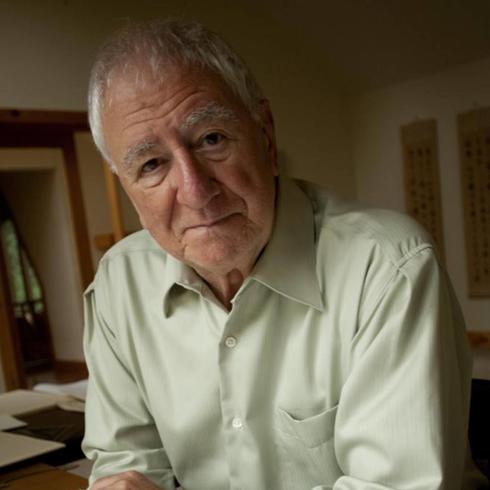© Ted Gordon/Schott Music
Through more than a hundred published works and many recordings, Bernard Rands is established as a major figure in contemporary music. His work Canti del Sole, premièred by Paul Sperry, Zubin Mehta and the New York Philharmonic, won the 1984 Pulitzer Prize in Music. His large orchestral suites Le Tambourin won the 1986 Kennedy Center Friedheim Award. Conductors including Barenboim, Boulez, Berio, Maderna, Marriner, Mehta, Muti, Ozawa, Rilling, Salonen, Sawallisch, Schiff, Schuller, Schwarz, Silverstein, Sinopoli, Slatkin, von Dohnanyi, and Zinman, among others, have programmed his music.
The originality and distinctive character of his music have been variously described as ‘plangent lyricism’ with a ‘dramatic intensity’ and a ‘musicality and clarity of idea allied to a sophisticated and elegant technical mastery’ - qualities developed from his studies with Dallapiccola and Berio.
Rands served as Composer-in-Residence with The Philadelphia Orchestra for seven years, from 1989 to 1995 as part of the Meet The Composer Residency Program for the first three years, with four years continued funding by the Philadelphia Orchestra. Rands’s works are widely performed and frequently commercially recorded. His work, Canti d’Amor, recorded by Chanticleer, won a Grammy Award in 2000.
Born in England, Rands emigrated to the United States in 1975 becoming an American citizen in 1983. He has been honored by the American Academy and Institute of the Arts and Letters; Broadcast Music, Inc.; the Guggenheim Foundation; the National Endowment for the Arts; Meet the Composer; the Barlow, Fromm and Koussevitsky Foundations, among many others. In 2004, Rands was inducted to the American Academy of Arts & Letters.
Numerous commissions have come from The Suntory Hall in Tokyo; the New York Philharmonic; Carnegie Hall; the Boston Symphony Orchestra; the Cincinnati Symphony; the Los Angeles Philharmonic; The Philadelphia Orchestra; the BBC Symphony Orchestra; the National Symphony Orchestra; the Internationale Bach Akademie; the Eastman Wind Ensemble and the Chicago Symphony Orchestra. Many chamber works have resulted from commissions from major ensembles and festivals from around the world. His chamber opera, Belladonna, was commissioned by the Aspen Festival for its fiftieth anniversary in 1999.
A dedicated and passionate teacher, Rands has been guest composer at many international festivals and Composer-in-Residence at the Aspen and Tanglewood festivals and was Walter Bigelow Rosen Professor of Music at Harvard University.
Notable works include his opera Vincent (2011), which debuted to critical acclaim at Indiana University Opera Theatre, conducted by Arthur Fagen and directed by Vincent Liotta, Danza Petrificada (2011), which premiered with the Chicago Symphony Orchestra, led by the composer's
longtime friend and collaborator Maestro Riccardo Muti, Concerto for Piano and Orchestra (2014), which premiered with pianist Jonathan Biss and the Boston Symphony Orchestra with subsequent performances by the Gewandhausorchester Leipzig as well as with the BBC Scottish Symphony Orchestra at the 2014 BBC Proms, Folk Songs (2014), for voice and chamber ensemble, which premiered at the Tanglewood Festival of Contemporary Music, and Concerto for English Horn and Orchestra (2015), which premiered with soloist Robert Walters and The Cleveland Orchestra, conducted by Lionel Bringuier.
In recent years, Bernard Rands has composed a number of major additions to his distinguished catalogue of orchestral and chamber works. The Chicago Symphony Orchestra, led by Riccardo Muti, commissioned and performed the world premiere of DREAM in 2019, and Allen Tinkham led the Chicago Youth Symphony Orchestra in the world premiere performance of AURA at Chicago's Orchestra Hall in 2022 before taking the work on its European tour. The Spektral Quartet gave the world premiere of String Quartet Music in 2022 and that same year the Boston Symphony Orchestra performed the world premiere of Rands’s Symphonic Fantasy under the baton of Alan
Gilbert. Symphonic Fantasy will receive its UK premiere in February 2024 conducted by Hannu Lintu at the Barbican Centre in London.
Bernard Rands's music is published exclusively worldwide by Schott Music.
To learn more, visit www.bernardrands.com
[Schot Music, updated in July 2023]


